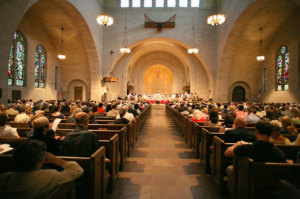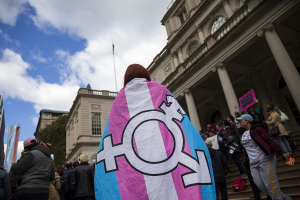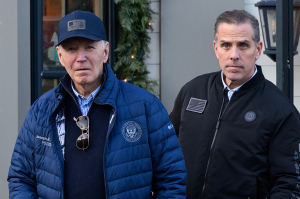Voddie Baucham doesn’t believe in ‘white privilege,’ thinks America on verge of ‘race war’
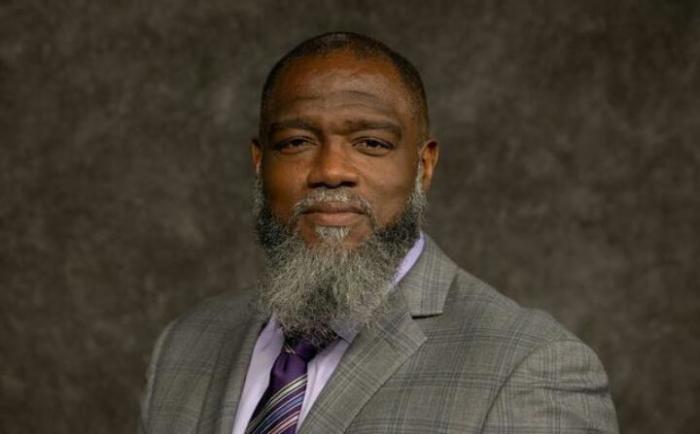
Although traditional Christian publishers turned their back on his latest book, Fault Lines: The Social Justice Movement and Evangelicalism's Looming Catastrophe, denouncing critical race theory and the social justice movement, prominent Southern Baptist preacher Voddie Baucham Jr. found a home for it at Salem Books, and it is now one of the most talked-about works in evangelicalism.
It is currently the No. 1 book in several Christian categories on Amazon and is listed among the top 100 bestselling books on the e-commerce website, where 95% of those who have reviewed it gave it a five-star rating. On the Evangelical Christian Publishers Association’s bestsellers list for May, it sits at the No. 2 spot.
Data from Salem Books show that since its official release on April 6, nearly 50,000 hard copies of the book and just under 10,000 ebooks have been sold.
“This author has given us the definitive handbook for responding biblically to the critical theories assaulting evangelicalism. This is confessional polemics at its best. The author has carefully defined the terminology crafted, the truth compromised, and the trajectory considered — in the enemy's battle against the sufficiency of the Scriptures,” gushed David Pitman, one of the many verified purchasers who gave Fault Lines a five-star review on Amazon.
“Though he has winsomely interwoven biographical and historical backgrounds, nevertheless, he never loses sight of the centrality of the cross of Christ. On page 233 he writes, ‘The Jew-Gentile divide was far more significant than the black-white one. If Christ took care of that on the cross, how much more did He take care of any man-made divisions we face today?’ I urge you to read this book carefully. The language, the logic, and the love in it — love for God and love for neighbor — are exactly the biblical message most needed in these tumultuous times,” Pitman wrote.
And these “tumultuous times” refer to the racial reckoning that has erupted in the evangelical church since the killing of George Floyd last May and the debate over whether issues like social justice and racial inequality should be explored through any other lens outside the Bible, such as critical race theory.
Critical race theory, as explained by Purdue University, "is a theoretical and interpretive mode that examines the appearance of race and racism across dominant cultural modes of expression. In adopting this approach, CRT scholars attempt to understand how victims of systemic racism are affected by cultural perceptions of race and how they are able to represent themselves to counter prejudice."
In the summer of 2019, the Southern Baptist Convention passed Resolution 9 “On Critical Race Theory and Intersectionality,” in which they defined CRT as "a set of analytical tools that explain how race has and continues to function in society. Intersectionality is the study of how different personal characteristics overlap to inform one’s experience."
Kimberlé Crenshaw, the law professor at Columbia and UCLA who coined the term intersectionality more than three decades ago, said, according to Time magazine: “It’s basically a lens, a prism, for seeing the way in which various forms of inequality often operate together and exacerbate each other. We tend to talk about race inequality as separate from inequality based on gender, class, sexuality or immigrant status. What’s often missing is how some people are subject to all of these, and the experience is not just the sum of its parts.”
While acknowledging that “critical race theory and intersectionality alone are insufficient to diagnose and redress the root causes of the social ills that they identify, which result from sin,” SBC leaders accepted in Resolution 9 that “these analytical tools can aid in evaluating a variety of human experiences.”
Many prominent Southern Baptists like Baucham decried the SBC for adopting the resolution, and he believes it should be scrapped at the SBC’s annual meeting in Nashville, Tennessee, next month.
“In terms of the SBC, I think there needs to be something done on Resolution 9. I think Resolution 9 was unfortunate, and I think there are a lot of things that led to Resolution 9 being passed that had nothing to do with whether or not the SBC believes or agrees with CRT and intersectionality. So I’m hopeful there will be an appropriate response at the convention next month because this stuff is poison. This stuff is deadly. It corrodes and destroys everything that it touches,” Baucham, who is dean of theology at African Christian University in Zambia and a board member of Founders Ministries, told The Christian Post in a recent interview.
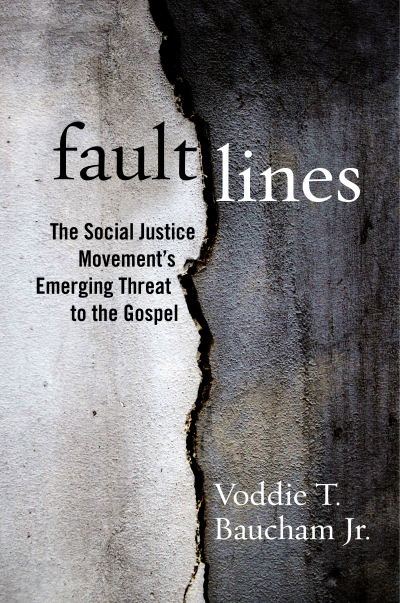
Baucham offers a primer of social justice terms in Fault Lines: The Social Justice Movement and Evangelicalism's Looming Catastrophe, and makes a case for why the cult of antiracism should be rejected. He doesn’t see anything redemptive in critical race theory and believes faithful Christians should not even consider it a useful analytical tool.
“[It is] absolutely not [a useful analytical tool]. CRT is built on premises that are anti-biblical. That would be akin to someone coming into your church and talking about Brahma, Vishnu and Shiva … and you coming and saying, ‘I understand these things come from Hinduism, but if we just look beyond the words and beyond the other religion, maybe there is something useful that we could use.’ That’s not what you do when somebody is coming with another gospel,” he said.
“The four main premises of critical race theory are things that we have to completely reject. The idea that racism is normal and unavoidable and ubiquitous in the United States and its history; the idea that white people are incapable of righteous actions on race unless their interests converge. You can’t get more anti-biblical than that,” Baucham explained. “…They reject objectivity and meritocracy, and their main idea is that we ascertain truth through narratives. Now, what part of that is a useful tool for Christians trying to understand racism? Absolutely none of it. So I think these people are completely wrong when they make this statement and they never get to specifics.
“They’ll say OK, CRT is a useful analytical tool, but they don’t say, here are the specific elements of CRT that are useful to us. And the other thing that they don’t do, is they don’t say here’s what CRT gives us that Bible and theology don’t give us. And that’s where this is hugely problematic because they’re essentially arguing that the Bible is not sufficient on issues of race, ethnicity, racism, et cetera., that CRT is needed to inform the Scriptures on these particular issues. So no, I couldn’t disagree more with people who try to take that third way or that middle ground,” he said. “There is no third way or middle ground with CRT and intersectionality.”
White privilege
In her groundbreaking essay, White Privilege: Unpacking the Invisible Knapsack, Peggy McIntosh describes the controversial concept as “an invisible package of unearned assets which I can count on cashing in each day.”
“I have come to see white privilege as an invisible package of unearned assets which I can count on cashing in each day, but about which I was ‘meant’ to remain oblivious. White privilege is like an invisible weightless knapsack of special provisions, maps, passports, codebooks, visas, clothes, tools and blank checks,” she wrote.
Baucham says he doesn’t believe in white privilege.
“I don’t agree with McIntosh and others on that concept or idea,” he said. “I don’t. I don’t believe that McIntosh was right. I don’t believe that that concept that comes from her is something that is real or is something that exists.”
When asked if he would agree that there is racial inequality, he said it would depend on how race is defined and noted that there is nowhere in the world where equality exists.
“It depends on what you mean by racial inequality. And it also depends on what you mean by race. I would need that term defined in terms of what is racial inequality. There is no place on Earth, nor has there ever been any place on Earth, where anything has been distributed equally among various people groups. No two groups of people are the same, which means that by definition, there is always going to be inequalities,” he said.
“And it goes both ways. I mean, in the NFL and the NBA, black people make up 75% and 80%, respectively, of those leagues. That’s racial inequality, right? Austrians, wherever you go in the world, are some of the best violin makers in whatever country they find themselves in. That would be racial inequality, but is that an evil? Is that a sin?
"So I think the problem is when people say racial inequality, what they are referring to is this idea that any disparate outcome equals injustice. And that is just completely unsupported by the facts,” he said.
And Baucham boldly tackles this issue in his book. In addressing the argument of disparity in policing, Baucham takes high-profile cases highlighted in mainstream media of black people killed by police such as Tamir Rice, Floyd, Breonna Taylor and Philando Castile, and compares them to similar cases where the victims are white but didn’t get much media attention.
“Have you heard of Tony Timpa? Like Floyd, ‘Timpa wailed and pleaded for help more than 30 times as officers pinned his shoulders, knees and neck to the ground,’ reported The Dallas Morning News in August 2016. Timpa, a 32-year-old schizophrenic, called the police himself, saying he was off his meds and needed help. When police arrived, Timpa had already been handcuffed by a security guard. Three Dallas Police Department officers restrained Timpa for nearly 14 minutes as he pleaded, ‘You’re gonna kill me! You’re gonna kill me! You’re gonna kill me!’ Eventually, Timpa went limp, at which time the officers mocked him and made jokes. In the end, when the paramedics finally came and put Timpa’s flaccid body on a stretcher, one officer said, ‘I hope we didn’t kill him.’ But they had,” Baucham noted.
“The George Floyd case was indeed tragic. However, it was not unique. Nor does it represent clear evidence of a particular pattern of police brutality regarding black men. No one took to Twitter demanding that Christian leaders prove their bona fides by speaking out on the Timpa case, and no one wrote articles in leading Christian publications about losing sleep over it. In fact, few—if any—of the people who mounted their moral high horses and took to the streets in protest over George Floyd even knew Tony Timpa’s name. Why? Because he was white, and his case did not advance the right narrative,” Baucham explained.
One Amazon critic who only discussed his assessment of the cases as Amazon Customer #1080, and only gave the book a one-star rating, called Baucham's assessment “disturbing.”
“Case after case is made that gives comfort, justification, and sanctuary to the senseless killings of unarmed African American men, women, and children. In doing so however, the writer succeeds in making the case that America indeed has a serious policing problem. This was undoubtedly unintended,” the critic wrote. “This book is deceptive. The author regurgitates the echo chamber talk of his sect. Drawing from an amalgamation of dated propaganda, Cold War Era rhetoric, and exaggerated unpersuasive arguments of fear, the writer will no doubt stir both a bizarre joy and philosophical panic in the religious minds of those who already lean the direction of his views.”
When asked if his target audience for the book was an echo chamber of sorts based on his arguments, Baucham said he considered the question an “insult.”
“I didn’t sit down and try to figure out how to write a book for an echo chamber. My goal in writing the book is my love for the bride of Christ and my belief that there is a threat to her. That threat to her is this modern ideology of social justice, critical race theory, intersectionality, critical theory. These ideologies — that I’ve been watching and speaking on and writing about since the early 2000s, by the way — these ideologies come straight out of classical Marxism,” he insisted.
“And cultural Marxism, these ideologies that have taken root in academia and that now are being talked about in popular culture by people who have no idea where they come from and no idea what these things mean and no idea how antithetical they are to biblical Christianity. So this is a threat. This is a wolf. And my job as a shepherd is to fight off wolves. This has nothing to do with echo chambers or want to please certain kinds of people. If anything, this book is the opposite of that,” he said.
He further pointed out that despite being evangelical, his positions have made him an outsider in the evangelical community.
“Popular evangelicalism is woke, so most of the things that I’m pointing out put me on the outside of the echo chamber, not the inside. I mean, I’m not going to be invited to CRU or Intervarsity or the Gospel Coalition or I could run down the list. I’m not going to be invited by any of those things that are the premier places in evangelicalism,” he said.
“Forget the SBC, forget the PCA, a Southern Baptist seminary couldn’t hire me today because of all of these ideas. They would be completely pilloried if they hired me. So far from writing for an echo chamber, I’m actually speaking out and putting myself outside the echo chamber.”
Baucham, who was some six weeks into his recovery from coronary bypass surgery when he spoke with CP, said he believes his book is resonating with evangelicals because many people are still grappling with the social justice movement.
“I haven’t divided up the people in terms of how many black people or how many white people I’ve heard from, but I’ve heard from people across the spectrum. And regardless of people’s color, what I’ve heard from people is: ‘This is a real issue. This is a real problem, and I’ve wanted to be able to wrap my head around it, and you helped me to wrap my head around it,’” he said.
For black Christians who don't agree with the narrative of the social justice movement, Baucham, who recently penned an op-ed for the New York Post titled, Why antiracism zealots are trying to silence black voices like mine, his voice on the issue has been a blessing.
“In terms of some black people, they’ve recognized if they speak out on this issue they get their head chopped off. They’re called sellouts, house ni**er, Uncle Tom … and so a lot of them are staying in the shadows because it’s just not safe to speak out on this issue,” he said.
“They’ve been very grateful to have another black Christian to speak out against this and somebody who has a platform, if you will. In terms of white Christians, you’ve been seeing similar things where they’re going, ‘I don’t agree with this narrative. And the minute I say I don’t agree with this narrative, I’m called racist. I’m called white supremacist,’ so on and so forth. So I think on all sides of this, because of the nature of what’s been going on over the last several months, a lot of people feel like this has given them a voice,” he added.
Like many evangelicals, Baucham sees the use of critical race theory by Christians as a threat to the Gospel, and he wasn’t afraid to highlight names of prominent evangelicals in his book, who he sees on both sides of the divide to which he currently sees no real solution.
“Why are people and groups like Thabiti Anyabwile, Tim Keller, Russell Moore, the Southern Baptist Convention, the Ethics and Religious Liberty Commission, 9Marks, the Gospel Coalition, and Together for the Gospel (T4G) being identified with Critical Social Justice on one side of the fault, and people like John MacArthur, Tom Ascol, Owen Strachan, Douglas Wilson, and the late R.C. Sproul being identified on the other?” he asks in the introduction of his 270-page book. “It is not a stretch to say we are seeing seismic shifts in the evangelical landscape. But is it an exaggeration to call this a coming catastrophe? I don’t think so,” he writes.
The divide is so strong, Baucham argues, that America is on the verge of a “race war.”
“I have pursued justice my entire Christian life. Yet I am about as ‘anti–social justice’ as they come—not because I have abandoned my obligation to ‘strive for peace with everyone, and for the holiness without which no one will see the Lord’ (Hebrews 12:14), but because I believe the current concept of social justice is incompatible with biblical Christianity,” he argues in the book.
“This is the main fault line at the root of the current debate—the epicenter of the Big One that, when it finally shifts with all its force, threatens to split evangelicalism right down the middle. Our problem is a lack of clarity and charity in our debate over the place, priority, practice, and definition of justice. The current cultural moment is precarious. The United States is on the verge of a race war, if not a complete cultural meltdown. And the rest of the Western world seems to be following suit. Tensions are rising in every place the African slave trade has left its indelible mark.”
Early this year, another prominent black Southern Baptist leader, Pastor Dwight McKissic, who founded and leads Cornerstone Baptist Church in Arlington, Texas, and where Baucham previously worked, according to his book, cut ties with the Southern Baptists of Texas Convention over its “strongly worded, anti-CRT policy that denounces all aspects of critical race theory” and warned that if leaders of the Southern Baptist Convention rescind Resolution 9 on critical race theory at their convention next month, he would cut ties with them too.
That announcement came amid an exodus of prominent black SBC pastors, such as Ralph West and Charlie Dates, over a decision by the denomination’s Council of Seminary Presidents to denounce critical race theory and intersectionality as incompatible with their beliefs at their 2020 annual session. The Council of Seminary Presidents, which is comprised of six seminaries, voted to reject CRT as incompatible with their faith while condemning “racism in any form.”
When asked what advice he had for the black pastors that left the denomination, Baucham said many of the ones who have left the nation’s largest Protestant denomination weren’t really that committed to the SBC.
“What’s interesting is most of the black pastors who have left weren’t very committed to the SBC in the first place. Many of them had recently come to the SBC and had been given platforms. They weren’t committed to the Baptist Faith and Message, they weren’t committed to the Southern Baptist doctrine, per se. Many of their churches weren’t contributing very much to the SBC. And so again, not in all cases, but in many cases, these people left because they were never really committed to the SBC in the first place,” he said.
When pressed further for what advice he would give them, he suggested they follow their conscience.
“I guess my message would be they need to go wherever their consciences dictate,” he said. “You don’t change the SBC by leaving. It’s one of the most diverse religious organizations in the world. And you don’t change it by leaving.”
For Christians who read his book, Baucham, who plans on heading back to Lusaka in mid-to-late June, wants them to get from his message that “the Gospel is under attack.”
“We are at war because this ideology is at war with the Gospel and is at war with Scripture. And so I wanted people to see that. I wanted people to see that this is about so much more than just black people see things one way, white people see things another way, Asians see things another way. It’s about so much more than that. And what’s ironic is that the rest of the culture is waking up to this,” he said.
“There are legislators now writing the law dealing with CRT because they see that it’s poison. And yet, Christians are still sitting around saying, well, useful analytical tool or third-way nuance … That’s why I chose the fault lines metaphor. That idea of an earthquake that’s coming that’s going to divide even more than it already has. On the one hand, I don’t want to see brothers and sisters divided. But on the other hand, I absolutely want to see a clear divide between the truth of the Gospel and the lie of CRT and anti-racism.”

















